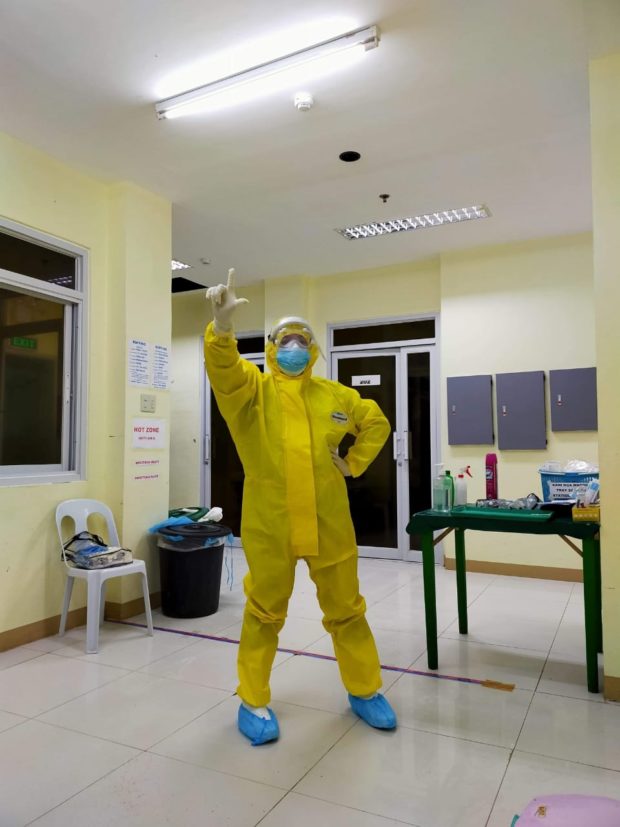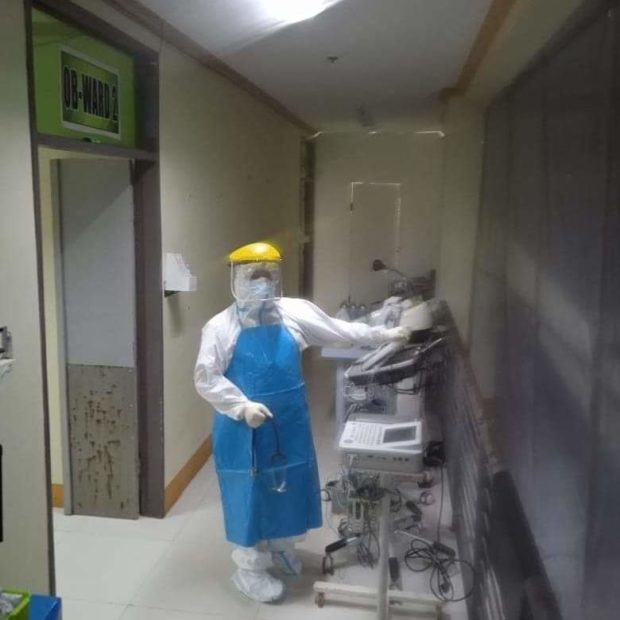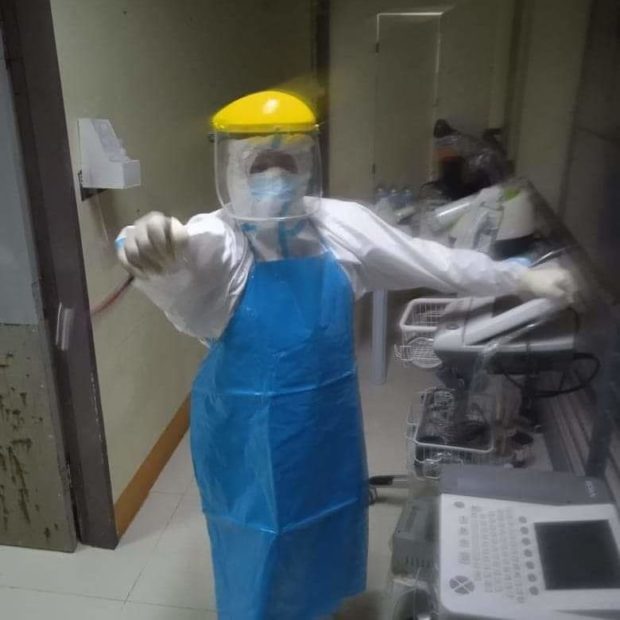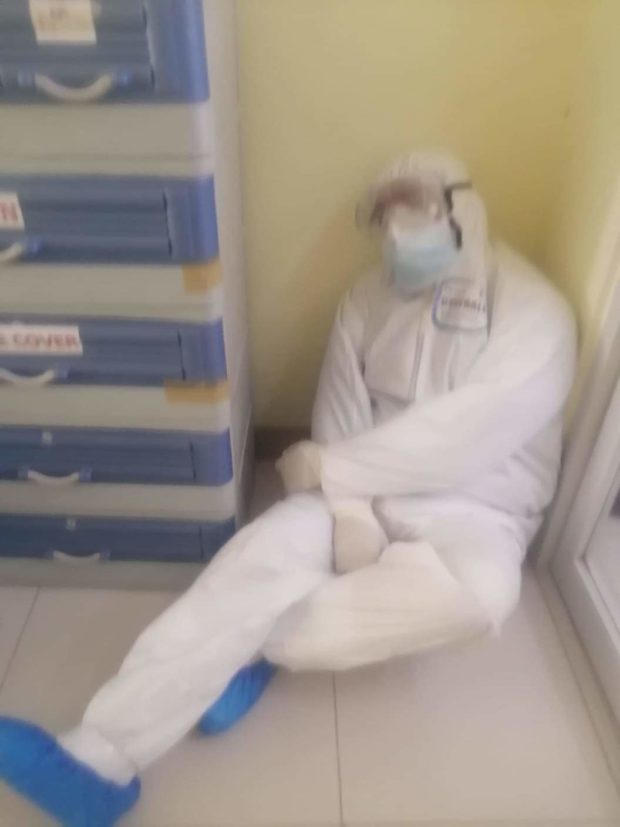No Lenten break in fight vs coronavirus, but ‘even heroes get tired’

Photo courtesy of Jun Ray Mendez
MANILA, Philippines — During this time in 2019, Jun Ray Mendez was with his family, spending time together bonding, praying, and visiting various churches around Surigao del Sur as part of their Holy Week tradition.
This time, Jun Ray is alone and isolated inside a hotel room and away from his family. Jun Ray is a nurse who just began his yet another round of quarantine after his ten-day duty handling and taking care of patients hit by the coronavirus disease (COVID-19).
Jun Ray said this is his second straight year spending the Holy Week away from his family.
When coronavirus stares you in the face
The first case of COVID-19 was detected in the Philippines back in January 2020 and Jun Ray was in the front lines when cases started reaching his province.
“Last year, nag-duty na ako sa COVID ward. Ground zero ng Holy Week. That was my first exposure sa COVID area. ‘Yung mga unang cases talaga na suspected, kami ang nag-handle talaga dito sa Surigao del Sur,” Jun Ray shared to INQUIRER.net.
(Last year, I was assigned to the COVID ward. It was ground zero, around Holy Week. That was my first exposure to the COVID area. We handled the first few suspected cases here in Surigao del Sur.)
“Last year, struggle pa talaga kasi lahat pa tayo, we’re learning kung ano ang dapat gawin. Ang hirap-hirap talaga. Takot na takot kaming [mag-approach] sa patient, pero wala kayong magagawa kasi andyan na,” he added.
(It was a struggle last year because we were just learning about how to deal with it. It was difficult. We were afraid to approach the patients, but what can we do? That is the situation presented.)
More than a year has passed since the pandemic reached the Philippines, Jun Ray said handling patients has become easier in the sense that they are more aware of the disease unlike before when everyone was just learning about it.

Photo courtesy of Jun Ray Mendez
Dealing with fear, stress
However, some things have yet to change, Jun Ray said. This includes long hours of work and the fear of contracting the disease.
Currently, Jun Ray is on his second day of quarantine after his ten-day shift. In his ten-day shift, Jun Ray has to render 12 hours of work per day together with his three other colleagues.
During this time, Jun Ray said they are not allowed to go home as they are directly dealing with COVID-19 patients. Instead of going home, they head straight to the hospital’s dormitory until the end of their ten-day duty and then transported to a hotel room to quarantine and get tested.
The only way they can communicate with their families is through video calls, said Jun Ray.
“Ang hirap ng experience. [Parang] more than one month akong naka-quarantine,” Jun Ray said.
(It is a difficult experience. We are like on quarantine for more than a month.)
Jun Ray’s prayer this Holy Week is simple: Have a negative swab test result each time he gets tested.
Patients’ last will
Jun Ray said that since families of COVID-19 patients are not allowed to stay with their loved ones, a female patient once told him her last will.
“I have one patient na amputated ang paa. Hindi makagalaw, limited lang. Toxic patient siya, severe case. Naiisip ko nanay ko ‘to, naghahabilin siya na kung mamatay na raw siya, pakisabi sa family ‘yung mga lupa,” Jun Ray said.
(I have one patient whose feet were amputated. Her movements are limited. She was a severe case and I can’t help but think about my mother. She was giving me her last will—to tell her family about their land and so on.)

Photo courtesy of Jun Ray Mendez
While the patient survived, Jun Ray said such cases put things into perspective: What if it’s me or my family in that situation?
Jun Ray said the fear of contracting the disease himself may have lessened through time, but it has always been at the back of their minds.
“Meron talagang takot… Kung natatakot ka, how much pa yung patients mo? Nakikita mo silang takot na takot din. Parang feeling nila mamamatay na sila. Kung takot ka, how much more sila?” Jun Ray said.
(There is fear… But if you are afraid, how much more are your patients? You can see them really afraid. They feel like they are about to die. If you are afraid, how much worse are their fears?)
“Kung takot ka, paano mo sila tutulungan kasi kailangan talaga nila ng support especially sa therapeutic communication. [Ang patients] nade-depress na. Ikaw din na nurse nade-depress na. Paano na yun? You have to be strong,” he added.
(If you are afraid, how can you help them? They really need support especially in therapeutic communication. The patients have also fallen depressed. The nurses are also depressed. What will happen? You have to be strong.)
Jun Ray even admitted that the pandemic has also led him to question the reason behind his decision to join the healthcare profession in the first place.
“Kaso, pagpasok mo doon sa COVID ward, walang bantay yung mga patients. Ang mga senior citizen, tayo ang nagche-change ng diaper. Lahat ng care tayo ang gumagawa,” Jun Ray said.
(But when you enter the COVID ward, you see the patients having no one to look after them. We change the diapers of the senior citizens. We make sure they are taken care of.)
“Pero nandyan na, pinasok mo, it’s your calling. Go na lang, work ka na lang,” he added.
(But that’s the situation and it’s your calling. You have to go to work.)
‘Pagod na’
While many would call healthcare workers as the “heroes” of the pandemic, Jun Ray said that the public has to remember that many healthcare workers are tired—with some, even succumbing to the disease.
“Pagod na ang bayani. Pagod na pagod na ang mga healthcare workers. Ang parati naming pine-pray ay sana matapos na kasi pagod na kaming lahat. It’s been a year of service. Hindi joke, totoong service talaga,” Jun Ray said.
(The heroes are now tired. The healthcare workers are tired. We always pray that this pandemic will be over soon because we are all tired. It’s been a year of service. It’s not a joke, but a real service.)

Photo courtesy of Jun Ray Mendez
“Ang hirap-hirap. Masyadong pagod. Drained na yung utak mo, nade-depress na kami. Sometimes umiiyak na lang kami ng di naman alam bakit. Masyadong kalungkutan ang nararamdaman namn during quarantine days,” he added.
(It’s difficult and we are tired. Our minds are drained and we are depressed. Sometimes, we see ourselves crying and we don’t even know why. There is so much sadness during our quarantine days.)
Aside from this, Jun Ray said that while hospitals try their best to provide support toward its employees, many healthcare workers also face other problems such as low compensation, lack of manpower, and the emotional toll of being away from their families.
“We deserve much better. We deserve more,” Jun Ray said.